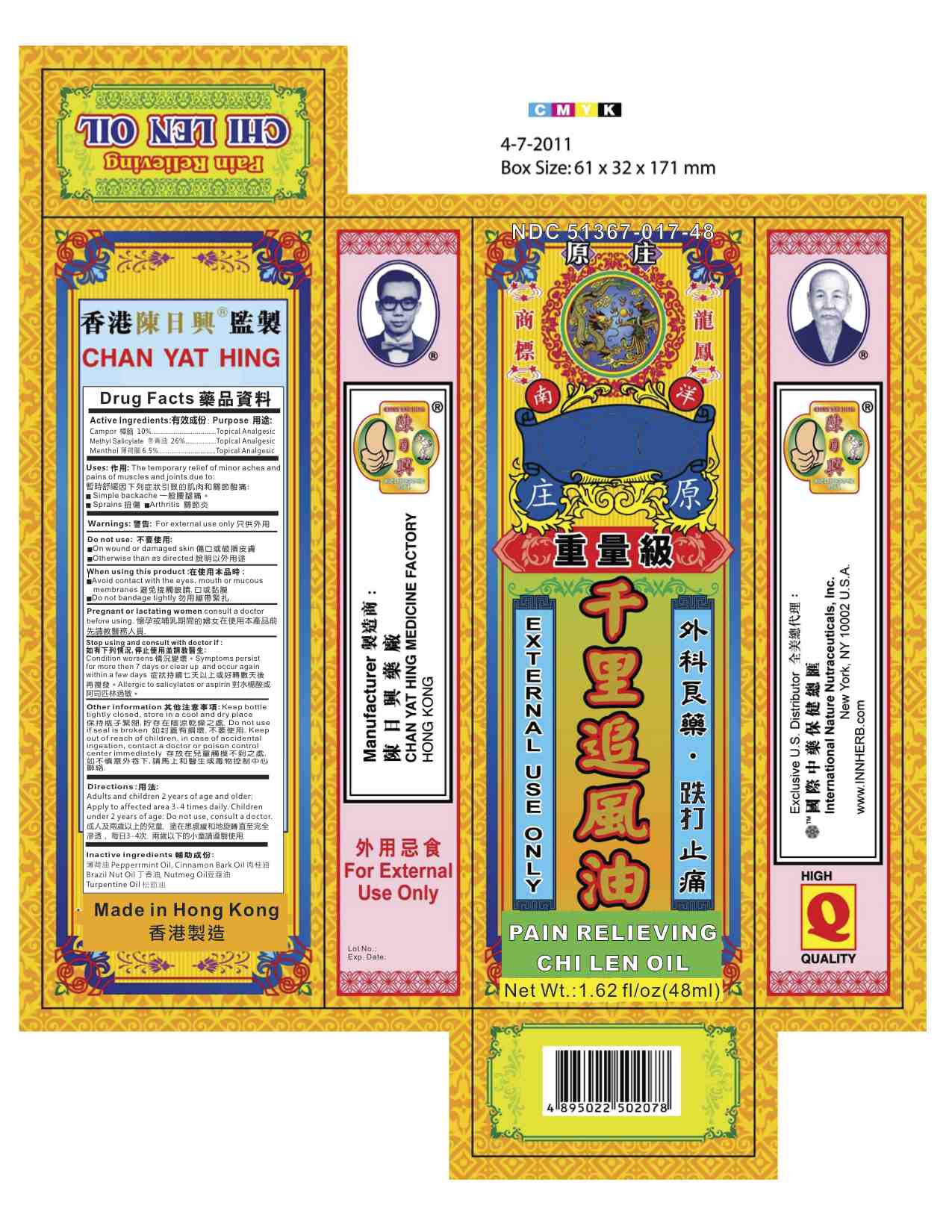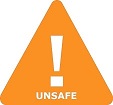Pain Relieving Chi Len Oil | Camphor, Methyl Salicylate, Menthol Oil while Breastfeeding

What is Pain Relieving Chi Len Oil | Camphor, Methyl Salicylate, Menthol Oil used for?
Purpose: Uses: The temporary relief of minor aches and pains of muscles and joints due to: 暫時舒緩因下列症狀引致的肌肉和關節酸痛: Simple backache 一般腰腿痛。 Sprains 扭傷 Arthritis 關節炎
Is using Pain Relieving Chi Len Oil | Camphor, Methyl Salicylate, Menthol Oil safe or dangerous while breastfeeding?

Pain Relieving Chi Len Oil | Camphor, Methyl Salicylate, Menthol Oil Breastfeeding Analsys
Camphor (natural) while Breastfeeding
UnsafeCAS Number: 76-22-2
Substance which can be extracted under distillation from the Camphor tree bark. Nowadays it is synthesized from the Turpentine. Used with creams and lotions as local anti-inflammatory agent. There is no proof of effectiveness as decongestant or expectorant when used in inhaled preparations, but as a toxic agent. Camphor is a highly lipophilic substance which is well absorbed by whatever via of administration (skin, inhalation, mouth) that crosses easily the cell membrane. Pharmacokinetic data support the likelihood of excretion into breast milk in a significant amount. Camphor has been shown to be toxic at low dose on infants in whom it may cause headache, vomiting, seizures and coma. It should never be administered by mouth. It is not appropriate its use during breastfeeding, and, in whatever case, it should not be applied on the mother's breast, since severe intoxications be occurred in infants after use of small ingested amounts. Be aware of not using it in the nostrils.
Methyl salicylate while Breastfeeding
SafeCAS Number: 69-72-7
It is topically used as a keratolytic, antiseptic, antifungal, dermatological and stomatological agent. At last update no published data on excretion into breast milk were found . Systemic absorption (distribution into the body) depends on the concentration of the product used and the duration of application. Absorption may reach 10 to 25% of the total amount applied on the skin. It is recommended not to use during lactation in large areas of skin or for prolonged periods. Available data on the elimination of Acetylsalicylic acid (Aspirin-ASA) in breast milk indicates it is clinically insignificant.No cases have been reported on Reye's syndrome by ASA through the breast milk which is considered very unlikely to occur with isolated and/or small doses used as antithrombotic treatments and anti-abortion measures, even less after application on the skin or topically in the mouth. Do not apply on the breast to prevent ingestion by the infant. If necessary, apply it after the feed and wipe it off thoroughly with water before the next feed.
Menthol while Breastfeeding
SafeHerb which is widely used by many cultures. It has been used even for pain relief during pregnancy and colicky pain in fussy babies (without proved data on this). Since it is non toxic at appropriate dose and a tiny excretion into breast milk of active metabolite Menthol, a moderate consumption is believed compatible while breastfeeding. Dessicated leaves and essential oil of the plant that contains Menthol are used. Properties that have been demonstrated and approved indications are: as spasmolytic for Dyspepsia, Irritable Colon and flatulence. It has been used for the treatment of cracked nipple with best results than placebo or Lanolin. Although with no proven effectiveness, it is traditionally used for cough relief, common cold, pain or itching by local application or inhalation. Overdosing of essential oil may be harmful. Do not expose infants to inhalation of products that contain Menthol (irritation of the air way) In case of use on the nipple, do it after feeding the baby and cleanse thoroughly the surface before the next one.
Pain Relieving Chi Len Oil | Camphor, Methyl Salicylate, Menthol Oil Breastfeeding Analsys - 2
Methyl salicylate while Breastfeeding
CAS Number: 69-72-7
No information is available on the clinical use of salicylic acid on the skin during breastfeeding. Because it is unlikely to be appreciably absorbed or appear in breastmilk, it is considered safe to use during breastfeeding.[1] Avoid application to areas of the body that might come in direct contact with the infant's skin or where the drug might be ingested by the infant via licking.
Menthol while Breastfeeding
Peppermint (Mentha x piperita) contains menthol, menthone, menthyl acetate as major ingredients. Minor ingredients include 1,8-cineole, pulegone, bitter substances, caffeic acid, flavonoids, and tannins. Peppermint is a purported galactogogue; however, no scientifically valid clinical trials support this use.[1] Galactogogues should never replace evaluation and counseling on modifiable factors that affect milk production.[2] Topical peppermint gel and solutions have been studied for the prevention of pain and cracked nipples and areolas in nursing women. The peppermint preparations were more effective than placebo and expressed breastmilk, and about as effective as lanolin,[3][4][5][6] although a meta-analysis concluded that application of nothing or breastmilk may be superior to lanolin, but good studies are lacking.[7] Menthol is excreted into breastmilk in small quantities; the excretion of other components have not been studied. Peppermint is "generally recognized as safe" (GRAS) as a food by the U.S. Food and Drug Administration. Large doses can cause heartburn, nausea and vomiting. Allergic reactions, including headache, have been reported to menthol. If peppermint is used on the nipples, it should be used after nursing and wiped off before the next nursing. Dietary supplements do not require extensive pre-marketing approval from the U.S. Food and Drug Administration. Manufacturers are responsible to ensure the safety, but do not need to the safety and effectiveness of dietary supplements before they are marketed. Dietary supplements may contain multiple ingredients, and differences are often found between labeled and actual ingredients or their amounts. A manufacturer may contract with an independent organization to verify the quality of a product or its ingredients, but that does certify the safety or effectiveness of a product. Because of the above issues, clinical testing results on one product may not be applicable to other products. More detailed information #about dietary supplements# is available elsewhere on the LactMed Web site.
I already used Pain Relieving Chi Len Oil | Camphor, Methyl Salicylate, Menthol Oil and meanwhile I breastfed my baby should I be concerned?
If you observer abnormal behavior or any other health issue in infant then you should immediately call 911 or contact other contact other emergency service provider in your area otherwise closely monitor the baby and inform your doctor about your Pain Relieving Chi Len Oil | Camphor, Methyl Salicylate, Menthol Oil usage and time interval of breastfeeding.
My doctor has prescribed me Pain Relieving Chi Len Oil | Camphor, Methyl Salicylate, Menthol Oil, what should I do?
If your doctor knows that you are breastfeeding mother and still prescribes Pain Relieving Chi Len Oil | Camphor, Methyl Salicylate, Menthol Oil then there must be good reason for that as Pain Relieving Chi Len Oil | Camphor, Methyl Salicylate, Menthol Oil is considered unsafe, It usually happens when doctor finds that overall advantage of taking
If I am using Pain Relieving Chi Len Oil | Camphor, Methyl Salicylate, Menthol Oil, will my baby need extra monitoring?
Yes, Extra monitoring is required if mother is using Pain Relieving Chi Len Oil | Camphor, Methyl Salicylate, Menthol Oil and breastfeeding as it is considered unsafe for baby.
Who can I talk to if I have questions about usage of Pain Relieving Chi Len Oil | Camphor, Methyl Salicylate, Menthol Oil in breastfeeding?
US
National Womens Health and Breastfeeding Helpline: 800-994-9662 (TDD 888-220-5446) 9 a.m. and 6 p.m. ET, Monday through Friday
UK
National Breastfeeding Helpline: 0300-100-0212 9.30am to 9.30pm, daily
Association of Breastfeeding Mothers: 0300-330-5453
La Leche League: 0345-120-2918
The Breastfeeding Network supporter line in Bengali and Sylheti: 0300-456-2421
National Childbirth Trust (NCT): 0300-330-0700
Australia
National Breastfeeding Helpline: 1800-686-268 24 hours a day, 7 days a week
Canada
Telehealth Ontario for breastfeeding: 1-866-797-0000 24 hours a day, 7 days a week
